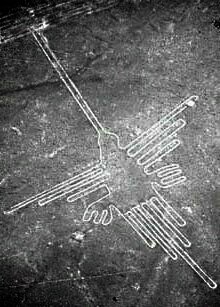It looks like you're using an Ad Blocker.
Please white-list or disable AboveTopSecret.com in your ad-blocking tool.
Thank you.
Some features of ATS will be disabled while you continue to use an ad-blocker.
share:
I think Q stands for Quatrain. As in the Quatrains of Nostradamus. Vague statements that can be applied as what one wants to see.
If you have something to say, or a truth to share, flippin spit out; else it's just a lame troll like the lame Nostradamus "Prophecies".
If you have something to say, or a truth to share, flippin spit out; else it's just a lame troll like the lame Nostradamus "Prophecies".
originally posted by: cherokeetroy
Your response makes no sense
Your theory makes no sense. They have so much control over the planet they they can control the advancement of science/spirituality but they need more control?
They need to hook us up to their tech but that tech is what is going to awaken humanity to what reality is?
You are just flinging things in all directions.
Wray Says 5 QAnon Conspiracy Advocates Arrested for Jan. 6 Capitol Attack
source
FBI director Christopher Wray told a Senate committee hearing that at least five self-identified advocates of the QAnon conspiracy theory have been arrested in connection with the January 6 attack on the U.S. Capitol complex.
“We have arrested at least five self-identified QAnon adherents related to the January 6 attacks specifically,” Wray told a hearing of the Senate Intelligence Committee on Worldwide Threats on Wednesday.
source
a reply to: crankyoldman
I totally forgot about that short-lived Chris Carter creation. The theme music contains samples of speeches given by Benito Mussolini. It was filmed prior to "The Matrix" but first aired a few months after the movie release.
Some of the theme songs in that show...
Rob Zombie - Superbeast
White Zombie - AstroCreep: 2000 - "Electric Head, Part 1" (The Agony)
Part 2 is "The Ecstasy"
People back then had no idea what any of that was really about, where we were headed (myself included) which I guess is why the show was cancelled so early. The 9 episodes can be found on youtube.
Speaking of VR this plays right into earlier post concerning -
Microsoft Wins $22 Billion Army Contract For Augmented Reality Headsets. Ready Player One.
I totally forgot about that short-lived Chris Carter creation. The theme music contains samples of speeches given by Benito Mussolini. It was filmed prior to "The Matrix" but first aired a few months after the movie release.
Some of the theme songs in that show...
Rob Zombie - Superbeast
White Zombie - AstroCreep: 2000 - "Electric Head, Part 1" (The Agony)
Part 2 is "The Ecstasy"
People back then had no idea what any of that was really about, where we were headed (myself included) which I guess is why the show was cancelled so early. The 9 episodes can be found on youtube.
Speaking of VR this plays right into earlier post concerning -
Microsoft Wins $22 Billion Army Contract For Augmented Reality Headsets. Ready Player One.
a reply to: cherokeetroy
Seeing the flaws in your logic takes no effort.
On top of that, none of it is particularly tied to Q.
Seeing the flaws in your logic takes no effort.
On top of that, none of it is particularly tied to Q.
a reply to: daskakik
I'm not saying this to be mean or insulting. It's simply an honest observation. You lack comprehension skills and you lack the ability to conceptualize outside of the boundaries of your own circular thought process. You take your frustration out on people who trigger the insecurities that you are experiencing but that you're not consciously aware of. You have some kind of negative emotional addiction or attachment to this thread and you refuse to address that. That's not my problem to sort out. It's not this thread's problem. It's yours
I'm not saying this to be mean or insulting. It's simply an honest observation. You lack comprehension skills and you lack the ability to conceptualize outside of the boundaries of your own circular thought process. You take your frustration out on people who trigger the insecurities that you are experiencing but that you're not consciously aware of. You have some kind of negative emotional addiction or attachment to this thread and you refuse to address that. That's not my problem to sort out. It's not this thread's problem. It's yours
a reply to: angelchemuel
That is one crazy story! Maybe we should pay more attention to this lake. Like we just got a verification sign about it or something. Future proves past!
Thank you Rel! You sent the same pic of the map I was trying to send Did you notice the October 6th place nearby and there was another one with a date also more North West of the Wonder land spot. Just thought they were little oddites even though they have been there forever Im sure. Had no reason to look until now.
And as far as Mr. Pools post go, my first thought was are those Poppies or Tulips? Afghanistan has those mountains thats suppose to be very rich in Gems if I recall. Such as Rubies Emeralds etc. Hmmm
That is one crazy story! Maybe we should pay more attention to this lake. Like we just got a verification sign about it or something. Future proves past!
Thank you Rel! You sent the same pic of the map I was trying to send Did you notice the October 6th place nearby and there was another one with a date also more North West of the Wonder land spot. Just thought they were little oddites even though they have been there forever Im sure. Had no reason to look until now.
And as far as Mr. Pools post go, my first thought was are those Poppies or Tulips? Afghanistan has those mountains thats suppose to be very rich in Gems if I recall. Such as Rubies Emeralds etc. Hmmm
a reply to: cherokeetroy
Your observation is incorrect.
Just like the false dichotomy that I replied to earlier in the thread. Being skeptical of Q doesn't mean that a person cannot entertain ideas about a reality that is larger than the material world.
It is odd since we went back and forth on that topic a while back, got posts deleted because of it.
So, first off, your Big TOE isn't synonymous with Q and 'the plan'. A person can think outside the box and still not end up at the conclusions you have arrived at and you not being able to refute the flaws being pointed out certainly isn't my problem.
Your observation is incorrect.
Just like the false dichotomy that I replied to earlier in the thread. Being skeptical of Q doesn't mean that a person cannot entertain ideas about a reality that is larger than the material world.
It is odd since we went back and forth on that topic a while back, got posts deleted because of it.
So, first off, your Big TOE isn't synonymous with Q and 'the plan'. A person can think outside the box and still not end up at the conclusions you have arrived at and you not being able to refute the flaws being pointed out certainly isn't my problem.
edit on 14-4-2021 by daskakik because: (no reason given)
a reply to: crankyoldman
Great post cranky!
Re getting people to realise the vaccination is worse for them than covid; I think we need someone to re-run and publicise results of the Spanish Flu Rosenau tests:
Great post cranky!
Re getting people to realise the vaccination is worse for them than covid; I think we need someone to re-run and publicise results of the Spanish Flu Rosenau tests:
The landmark study of Milton J. Rosenau, MD, “Experiments to Determine Mode of Spread of Influenza,” was published in the Journal of the American Medical Association in 1919.
They isolated microbial mixtures from the throat and noses of carefully selected influenza cases from an outbreak location. The researchers then administered these to 10 young U.S. navy volunteers without prior exposure to influenza. None fell sick.
They drew blood from influenza patients and transferred it to the navy volunteers. None fell sick.
They collected influenza patients’ mucous membranes with swabs and filtered them to exclude larger microbes like bacteria. They then injected the filtrate into the navy volunteers. None fell sick.
They brought the navy volunteers to meet influenza patients. They shook hands and conversed. The patients also exhaled (as hard as possible) onto the volunteers’ face for five times. Then the patients cough directly onto the volunteers. None fell sick.
In case these ten navy volunteers were somehow immune, though unlikely as they had no prior influenza exposure, the study recruited another set of 50 volunteers. They repeat the experiment with influenza patients from another outbreak location, but could not prove human-to-human transmission. And, intriguingly, one physician involved in the study contracted influenza.
“I think we must be very careful not to draw any positive conclusions from the negative results of this kind. Many factors must be considered. Our volunteers may not have been susceptible. They may have been immune,” Dr Rosenau addressed. “We entered the outbreak with a notion that we knew the cause of the disease, and were quite sure we knew how it was transmitted from person to person,” he concluded. “Perhaps, if we have learned anything, it is that we are not quite sure what we know about the disease.”
Other eight human experiments, documented in “Experiments Upon Volunteers to Determine the Cause and Mode of Spread of Influenza, Boston, November and December, 1918,” also failed to confirm how the Spanish flu spread. “Our failure, however, to reproduce the disease with these discharges suggests that there may be unknown factors involved, either in the discharge of the virus from the body, or in its entrance into the victim, or both,” the document ended.
“Perhaps, if we have learned anything, it is that we are not quite sure what we know about the disease.”
Reviewing these studies, John M. Eyler, PhD in the historical science at the University of Minnesota, said in a 2010 paper: “It seemed that what was acknowledged to be one of the most contagious of communicable diseases could not be transferred under experimental conditions.”
a reply to: RelSciHistItSufi
Those tests were done using a bacteria called Pfeiffer's bacillus.
The write up can bee seen here:
Seems all they may have proven was that Pfeiffer's bacillus was not the cause of the spanish flu. Not sure why you think that has anything to do with covid vs. covid vax.
Those tests were done using a bacteria called Pfeiffer's bacillus.
The write up can bee seen here:
Seems all they may have proven was that Pfeiffer's bacillus was not the cause of the spanish flu. Not sure why you think that has anything to do with covid vs. covid vax.
a reply to: RelSciHistItSufi
Yet there are stories about the gods taking revenge on people in ancient Hubei Province of China. Strange how that works.
Yet there are stories about the gods taking revenge on people in ancient Hubei Province of China. Strange how that works.
Skeptics vs. Cynics: Know Which Are Toxic?
source
The Difference Between A Skeptic and a Cynic
Let’s define the terms. According to the Oxford Dictionary:
Skeptic: A person inclined to question or doubt all accepted opinions.
Cynic: A person who believes that people are motivated purely by self-interest rather than acting for honorable reasonsI like that definition, but here’s one from the Free Dictionary that goes more to the point:
Cynic: A person whose outlook is scornfully and often habitually negative.
Skeptics can be extremely useful members of a team. They don't just accept ideas, proposals, opinions, or even “facts” as offered – they need to be convinced.
Skeptics like to look at data. They like to analyze. They like to assess. Skeptics like to weigh and measure and draw their own conclusions.
Skeptics don’t wear rose-colored glasses. Skeptics temper the enthusiasm – often in a good way – of the instantly enthusiastic and in the process often apply a level of analysis and rigor that transforms a good idea into a great idea — and just as important, help recognize bad ideas.
Cynics, on the other hand, are toxic. At a fundamental level they don’t believe in goodness. Cynics don’t believe in the capability of other people to overcome, to rise up, and to achieve. They don’t believe in new ideas because, at heart, they don’t believe in people (including themselves.).
Here are a few ways to tell the difference between a skeptic and a cynic:
· Skeptics look for holes in your idea because they want to help you plug those holes. Cynics look for holes so they can make them bigger and sink your idea.
· Skeptics ask questions to try to make your idea better. Cynics ask questions to try to make you look stupid or incompetent.
Skeptics say, “I’m not sure if you have enough data to support that… lets do some digging and figure it out.” Cynics say, “You don’t have enough data to support that. You’ll have to prove to me that you’re right.” (And you never can.)
Every team needs at least one skeptic. Every team needs at least one person willing to ask questions, identify potential problems, and point out when more analysis is necessary.
No team needs a cynic. No team needs a person who always says no… not because they don’t believe in ideas but because they don’t believe in people.
source
edit on 14-4-2021 by cherokeetroy because: (no reason given)
originally posted by: EndtheMadnessNow
a reply to: crankyoldman
I totally forgot about that short-lived Chris Carter creation. The theme music contains samples of speeches given by Benito Mussolini. It was filmed prior to "The Matrix" but first aired a few months after the movie release.
Some of the theme songs in that show...
Rob Zombie - Superbeast
White Zombie - AstroCreep: 2000 - "Electric Head, Part 1" (The Agony)
Part 2 is "The Ecstasy"
People back then had no idea what any of that was really about, where we were headed (myself included) which I guess is why the show was cancelled so early. The 9 episodes can be found on youtube.
Speaking of VR this plays right into earlier post concerning -
Microsoft Wins $22 Billion Army Contract For Augmented Reality Headsets. Ready Player One.
Crazy, I have a connection to both included in your post - from the same time period. Actually, the only reason I ever saw the show was a friend was in it. Not surprised it was "canceled"
a reply to: EndtheMadnessNow
When I watched this, I noticed the first thing I thought of in the beginning was a crop circle from long ago.


I know it isnt a exact match, but like I said it was the first place my brain went when I saw it. There is also this other old one,, the humming bird. If you melded the two together, it would be a pretty good match.

Dont forget we had that Alien one show up next to the observatory a long time ago and with the computer chip. I forget the order they showed up but there was a response over night.
I dont know, I just keep thinking we are going to have visitors soon, or maybe I should say they have come back and its time for them to show themselves again. Im assuming you guys know which famous Alien one Im referring to
There sure was a lot of symbology in that very short video. Almost have to watch it frame by frame. I did do a article on this place back in 2018 I believe, but I forget what triggered me to do it.
When I watched this, I noticed the first thing I thought of in the beginning was a crop circle from long ago.


I know it isnt a exact match, but like I said it was the first place my brain went when I saw it. There is also this other old one,, the humming bird. If you melded the two together, it would be a pretty good match.

Dont forget we had that Alien one show up next to the observatory a long time ago and with the computer chip. I forget the order they showed up but there was a response over night.
I dont know, I just keep thinking we are going to have visitors soon, or maybe I should say they have come back and its time for them to show themselves again. Im assuming you guys know which famous Alien one Im referring to
There sure was a lot of symbology in that very short video. Almost have to watch it frame by frame. I did do a article on this place back in 2018 I believe, but I forget what triggered me to do it.
DJT speaks with Gorka on rumble.

17 posts with +++ with several date matching timestamps.
75 million is fact it would seem. Does it get to 80?

17 posts with +++ with several date matching timestamps.
75 million is fact it would seem. Does it get to 80?
Please standby for intermission...Who didn't see this coming...The Fast And Furious franchise is going to space...

More mindless entrainment.

More mindless entrainment.
new topics
-
Democrats send letter to Biden urging him to ratify Equal Rights Amendment
US Political Madness: 5 hours ago
top topics
-
Reprehensible Behavior
US Political Madness: 17 hours ago, 11 flags -
This is adorable you guys!
General Chit Chat: 16 hours ago, 9 flags -
Democrats send letter to Biden urging him to ratify Equal Rights Amendment
US Political Madness: 5 hours ago, 2 flags
active topics
-
-@TH3WH17ERABB17- -Q- ---TIME TO SHOW THE WORLD--- -Part- --44--
Dissecting Disinformation • 3715 • : IndieA -
Democrats send letter to Biden urging him to ratify Equal Rights Amendment
US Political Madness • 3 • : BernnieJGato -
Only two Navy destroyers currently operational as fleet size hits record low
Military Projects • 24 • : Freeborn -
Defending the need for adherence to Old Testament commandments under the new covenant of Christ
Conspiracies in Religions • 27 • : FlyersFan -
Those Fake Death Numbers From Hamas Out Of Gaza
Middle East Issues • 193 • : FlyersFan -
Rant. I am sick of people saying the police are revenue raising.
Rant • 13 • : PorkChop96 -
Light from Space Might Be Travelling Instantaneously
Space Exploration • 28 • : Lazy88 -
More Bad News for Labour and Rachel Reeves Stole Christmas from Working Families
Regional Politics • 9 • : covent -
Post A Funny (T&C Friendly) Pic Part IV: The LOL awakens!
General Chit Chat • 7914 • : Cymru -
George Stephanopoulos and ABC agree to pay $15 million to settle Trump defamation suit
Mainstream News • 25 • : Echo007
